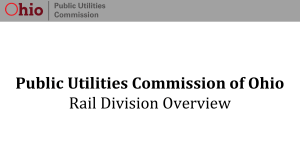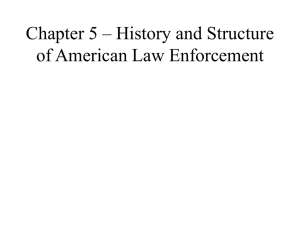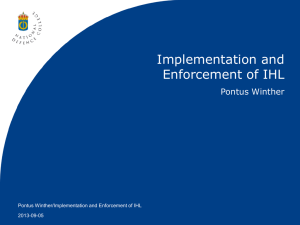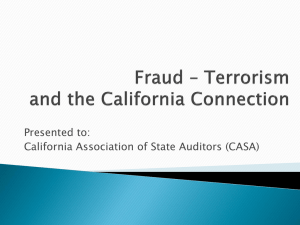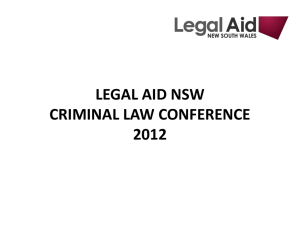Dia 1 - Vhrm
advertisement
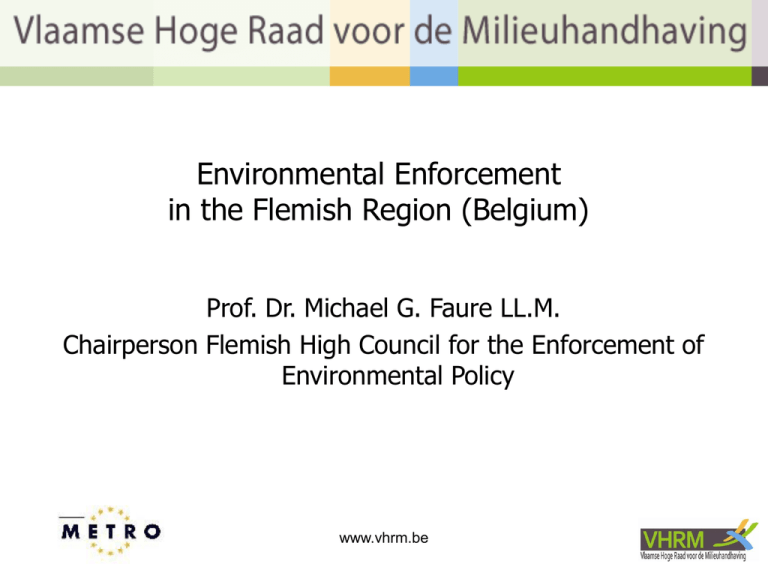
Environmental Enforcement in the Flemish Region (Belgium) Prof. Dr. Michael G. Faure LL.M. Chairperson Flemish High Council for the Enforcement of Environmental Policy www.vhrm.be 1 Structure 1. 2. 3. 4. 5. 6. 7. 8. 9. Introduction Historical background Important steps in the nineties Remaining problems: empirics A new environmental law enforcement in the Flemish Region Administrative enforcement Criminal law provisions New institutions Concluding remarks www.vhrm.be 2 1. Introduction • Environmental enforcement in the Flemish Region has been a source of worry • Silent revolution on 1st May 2008 • Interesting new integrated enforcement model, combining administrative and criminal law enforcement • Of course, experience very “fresh”, still too young for final judgment www.vhrm.be 3 2. Historical background • Environmental enforcement started with one prosecutor in the 1980s • Clean-up Antwerp harbour • But results were (somewhat) disappointing, many acquittals: – No criminal liability of legal entities – Legislative framework not sufficient/unclear – No specialized prosecutors or magistrates – But: behavioural change with industry www.vhrm.be 4 3. Important steps in the nineties • Interuniversity commission for the revision of environmental law in the Flemish Region (Bocken) • Draft decree environmental policy 1995 • Lead to a modernization of Flemish environmental law and policy: soil sanitation decree etc. • Already earlier: entry into force of new environmental permitting decree (September 1991) www.vhrm.be 5 3. Important steps in the nineties • Important: 4 May 1999: introduction criminal liability of legal entities – Necessary for law enforcement – But also for industry – Still, perhaps not perfect • Now: increasing specialization of public prosecutors and magistrates (but strong regional differences) www.vhrm.be 6 4. Remaining problems: empirics • Pollak, Billiet and Rousseau (textile industry 2005): • Only in 20-30 % of inspections: enforcement (notice of violation, consultation or warning) • Probability of being controlled: once in ten years • But: targeting! www.vhrm.be 7 4. Remaining problems: empirics • Billiet-Rousseau: average fines (Ghent): – For legal entities: • € 14,569 in first instance • € 10,733 in appeal – For natural persons: • € 3,787 in first instance • € 7,061 in appeal – Average expected sanction (p x S) low: • € 87.7 • € 167 • € 181 www.vhrm.be 8 4. Remaining problems: empirics • Yearly reports of environmental inspectorate confirm this: • Prosecution before courts only 10 % • Dismissals on average 62 % (however, these contain also technical dismissals) • Results: – Probability of control statistically very low – Average criminal fine (and resulting expected sanction) low – Large differences between provinces www.vhrm.be 9 4. Remaining problems: empirics • Dismissals high • As such, this is understandable (targeting by prosecutors, given limited budget) • However, some cases, worth of being prosecuted are dismissed (because lacking alternative for criminal law) www.vhrm.be 10 5. A new environmental law enforcement in the Flemish Region • Decree of 21 December 2007 • Interuniversity commission as basis (started in 1990) • Core points: – Harmonization of inspection rights – Harmonization of environmental criminal law – New relationship between criminal and administrative law www.vhrm.be 11 5. A new environmental law enforcement in the Flemish Region – Creation of new institutions – Flemish High Council for Environmental Law Enforcement (coordinating tasks) – Environmental court (administrative court) www.vhrm.be 12 6. Administrative enforcement 6.1 Administrative law enforcement consists of: • Administrative measures Or • Administrative fines + (in addition) • Administrative removal of illegal gains www.vhrm.be 13 6. Administrative enforcement 6.2. Administrative measures or administrative fines: only for facts that violate legal provisions (principle of legality) • And in proportion to the facts to which the measure of fine is a reaction (proportionality principle) www.vhrm.be 14 6. Administrative enforcement 6.3. Administrative measure: prevention or restauration (for example an injunction/order to stop certain works, partial or total shutdown of an enterprise, aiming at ending the environmental offence or crime) • Not revolutionary www.vhrm.be 15 6. Administrative enforcement 6.4. Environmental fine: the duty imposed upon the perpetrator to pay a specific sum of money + inflation correction is applicable (x 5.5) + removal of illegal gain 6.5 Exclusive administrative fine: foreign environmental offence max. € 50,000 Offences are those established on a list by the Flemish government www.vhrm.be 16 6. Administrative enforcement • Alternative administrative fine: for environmental crimes: max. € 250,000 6.6 Imposition of the exclusive administrative fine • By the regional administrative authority after a notice of violation • Against the decision of the regional authority appeal is possible with the environmental court (not suspensive) www.vhrm.be 17 6. Administrative enforcement 6.7. Imposition of the alternative administrative fine • After the establishment of an environmental crime: inspector sends a notice of violation to the prosecutor • Inspector requests the prosecutor to indicate whether he wants to prosecute the crime or not www.vhrm.be 18 6. Administrative enforcement • Prosecutor has 180 days + in addition max. 180 days for a motivated decision • In this period: imposition of administrative fine impossible • When prosecutor decides for criminal prosecution: imposition administrative fine impossible • If the prosecutor fails to decide: administrative fine impossible! (contrary to Walloon Region) www.vhrm.be 19 6. Administrative enforcement • When the prosecutor decides that no prosecution will take place: right to prosecute fails • Alternative administrative fine: again, administrative procedure, imposition by regional authority and • Possibility of appeal to environmental court (not suspensive) www.vhrm.be 20 7. Criminal law provisions 7.1. General provision 16.6.1. • Any intentional or negligent violation of the law: one month to two years and/or € 100 € 250,000 • But: not applicable to environmental offences: there, only exclusive administrative fine! www.vhrm.be 21 7. Criminal law provisions 7.2. Intentional acts against administrative measures, fines or other measures: one month – one year and/or € 100 – € 100,000 7.3. 16.6.2.: intentional and unlawful emission: one month – five years and/or € 100 - € 500,000 • In case of negligence: one month – three years and/or € 100 - € 350,000 www.vhrm.be 22 7. Criminal law provisions 7.4. Intentional and unlawful disposal of waste: one month – five years and/or € 100 - € 500,000 • In case of negligence: one month/three years and/or € 100 - € 350,000 7.5. As safety measure, the judge can impose the prohibition to run the installation that constituted the basis for the violation www.vhrm.be 23 7. Criminal law provisions 7.6. Weakness: no autonomous environmental crime, but administrative dependence (contrary to the proposals of interuniversity commission) Hence: only crime and prosecution possible when administrative duties are violated (weakness) www.vhrm.be 24 8. New institutions 8.1. Flemish High Council for the Enforcement of Environmental Law • Has a permanent secretariat of three persons • Chair person, vice person, which form with secretariat the bureau (daily management) • Many members, representative of all environmental enforcement organizations (prosecutors, police, local and provincial authorities, waste authority, regional entity etc.) + replacement www.vhrm.be 25 8. New institutions • General meetings with entire committee every month • Specific subcommittees to make agreements on specific points e.g. – How to establish a crime? – Who visits which type of entities? – Coordination between administrative and criminal law enforcement – Information exchange www.vhrm.be 26 8. New institutions – Data collection – New developments e.g. better regulation, smart environmental law enforcement • Task: determine core lines and priorities for the environmental enforcement policy in Flemish Region • Publish an environmental law enforcement programme (for the coming year) • Publish an environmental law enforcement report (on the past year) www.vhrm.be 27 8. New institutions • In general, taking care of coordination of environmental law enforcement in the Flemish Region www.vhrm.be 28 8. New institutions 8.2. Environmental Court • It is an administrative court • Important task: judges take decisions (judgements) on appeal against decisions of the regional authority • Six members + replacements www.vhrm.be 29 8. New institutions • Chair person and vice chair are lawyers, some other members non-lawyers • Court is independent from government • Has a permanent secretary www.vhrm.be 30 9. Concluding remarks 9.1. New decree important revolution: • General introduction of administrative law enforcement • Shift of emphasis towards administrative enforcement • Important harmonization of environmental crime • Important possibilities for coordination administrative-criminal law, but also www.vhrm.be 31 9. Concluding remarks • Possibilities to coordinate environmental enforcement policy generally via High Council 9.2. Evaluation: on paper looks positive • Introduction administrative law enforcement can increase effectiveness law enforcement • Advantage: criminal law can focus on important issues www.vhrm.be 32 9. Concluding remarks • Of course, effectiveness will eventually depend upon practice • Important coordination task for High Council • Notwithstanding many uncertainties, this important revision can potentially lead to: www.vhrm.be 33 9. Concluding remarks • Change improved environmental law enforcement in the Flemish Region! www.vhrm.be 34


